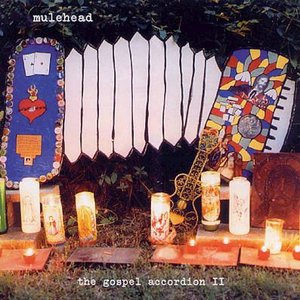
Published on Sep 22, 1999
I don’t believe it’s any secret that I work with publicists when
it comes to getting new groups reviewed on “The Daily Vault”.
Often, these discs come generally unsolicited, meaning I have a
wonderful field of dreams to wade through each week (as well as the
occasional landmine).
I got talking with the publicist for Mulehead, an Arkansas-based
four piece whose blend of honky-tonk raucous rock is similar to a
few groups on the market today. As he was describing the band in an
effort to get me to listen to the disc, he mentioned the way they
mix humor with their music. Ah, I said, kind of like The Bottle
Rockets, eh?
Well, sorry, Mark, but the level of humor that Kevin Kerby and
crew use never rises to the plateaus set by the Bottle Rockets. I
will say this much about Mulehead’s sophomore release
The Gospel Accordion II: it’s a great record to get absorbed
in.
The band – vocalist/guitarist Kirby, guitarist/vocalist Dave
Raymond, bassist/multi-instrumentalist Brent Labeau and drummer
Geoff Curran – does sound like a bastard child of Southern rock,
creating a glorious noise that reflects a refreshing attack on
music so desparately missed these days. This is not your father’s
Marshall Tucker Band – and that, I’m sure, suits Mulehead just
fine, thank you very much.
Some of the finer moments on
The Gospel Accordion II you can almost predict from the
track listing on the CD. “Busted” is a surprisingly powerful track
that shows the reality of life in hard times in contrast with the
dreams one once had. “Get Thee Behind Me Satan” is a rollicking
good time that dares to flip off the Evil One himself (gee, and I
thought Prince would never find work again); try and not laugh at
some of the things Kirby and crew come up with on this one.
This isn’t to say that each song is a hit. “When The Dope Ran
Out (So Did She)” sounds on paper like it could be a track worthy
of Jimmy Buffett, but too much repetition and musical wandering do
this song in far before its prime. Likewise, “Glad To Be Here” just
never seems to get off the ground, and is a relative
disappointment.
Then there are the tracks that catch your ear from left field.
Songs like “Out Here In The Pines,” “Lullaby For Catfish” and “Dig
My Grave” all are killer tracks that you’ll find yourself going
back to time and time again, while “Ozark” is a pretty (albeit too
short) instrumental piece that finds Mulehead getting to the core
of their sound.
I’ve made comparisons between Mulehead and the Bottle Rockets
earlier; but the only thing that these two bands share is their
roots in country-rock. Mulehead proves that they are very much
their own band, and deserve to be taken on their own merits – of
which there are many.
Mulehead is a band you might never have heard of, and
The Gospel Accordion II is not the kind of album you’d
quickly find on the shelves at Borders. But both the band and the
album are well worth searching out.